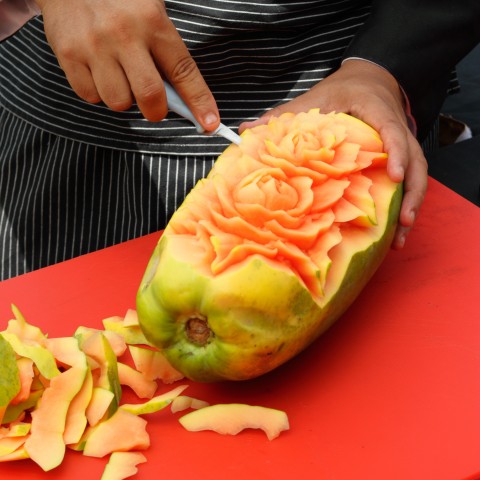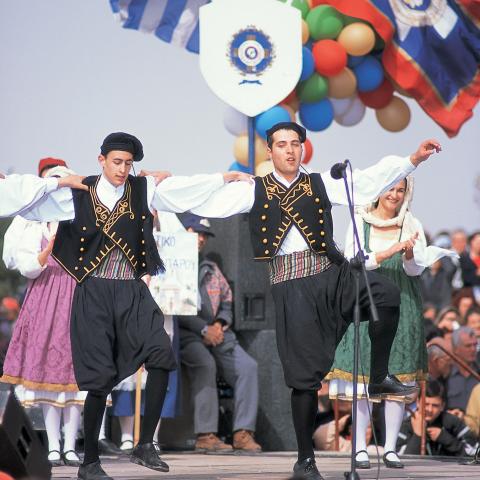
Greek is undoubtedly a language with a long history. As the centuries pass by, the Greek language has been influenced by wars and changes in lifestyle and culture. The result is the creation of a rich language, with many idioms and colloquialisms: modern Greek.
There are a few untranslatable words in modern Greek, which are unique and can’t be translated effectively in other languages with one word. This group of words is widely used in everyday life and can be difficult to understand without a proper explanation. So, have you ever wondered what μάγκας (mángas), μεράκι (meráki), or καημός (kaimós) mean? We’ve got your back!
In this article, we’ve gathered ten Greek words with unique meanings, which can’t be translated effectively into English. Because you’re bound to run into some untranslatable words in learning Greek. By learning them, you’ll get a glimpse of Greek culture and history, as they tend to be related to various historical and cultural aspects. Plus, if you use them properly, you’ll sound like a native Greek speaker, and understand greek programs and conversations better.

Let’s take a look at ten of the most popular Greek untranslatable words that are used in everyday life.
Table of Contents
- Φιλότιμο (Filótimo)
- Μεράκι (Meráki)
- Παλικάρι (Palikári)
- Κελεπούρι (Kelepúri)
- Ξεροσφύρι (Xerosfíri) & Μεζές (Mezés)
- Λεβέντης (Levéndis)
- Καημός (Kaimós)
- Μάγκας (Mángas)
- Ρε (Re)
- Όπα! (Ópa!)
- Conclusion
Start with a bonus, and download the Must-Know Beginner Vocabulary PDF for FREE! (Logged-In Member Only)

1. Φιλότιμο (Filótimo)
This word refers to a sense of dignity, responsibility, and honor. It’s usually used to characterize someone who’s focused on doing a job well and who’s generally a well-behaved and dedicated person.
- Greek: Η Άννα δουλεύει σκληρά και έχει φιλότιμο.
- Romanization: I Ánna dulévi sklirá ke éhi filótimo.
- Meaning: “Anna works hard and has a sense of responsibility.”
This word is a noun. However, it can be adjusted and used as an adjective, as well. In this case, the adjective would be φιλότιμος (filótimos) characterizing a masculine noun, φιλότιμη (filótimi) characterizing a feminine noun, and φιλότιμο (filótimo) characterizing a neutral noun.
2. Μεράκι (Meráki)
This word is used to express a sense of devotion, zeal, and eagerness, along with love and a touch of an artistic view. It may be one of the most beautiful Greek untranslatable words. It’s often used to characterize handicrafts, which are elegant, thoughtful, and made with love.
- Greek: Αυτό το χειροποίητο κόσμημα φτιάχτηκε με μεράκι.
- Romanization: Aftó to hiropíito kósmima ftiáhtike me meráki.
- Meaning: “This handmade jewelry was made with devotion and love.”
3. Παλικάρι (Palikári)
This untranslatable word in Greek refers to a young, brave, and proud man. It’s actually a noun used to characterize a strong and fearless young man. It’s often used to highlight how much a boy has grown to become a courageous man.
- Greek: Ο μικρός Νικόλας μεγάλωσε και έγινε ολόκληρο παλικάρι.
- Romanization: O mikrós Nikólas megálose ke éyine olókliro palikári.
- Meaning: “Young Nikolas has grown up and became a brave and proud man.”
Historically, this word emerged during the Greek War of Independence, (1821-29). Back then, a παλικάρι (palikári) was a member of a fighting group, led by a captain, a thief or sinner, or a member of a gang of thieves.
4. Κελεπούρι (Kelepúri)
This word is used for showing that something is an exceptional bargain (literally) or a spectacular find (metaphorically). This noun is often used to describe a value for money, or metaphorically a really good person who seems to be perfect in every aspect.
- Greek: Να τον παντρευτείς αυτόν τον άνδρα, γιατί είναι κελεπούρι.
- Romanization: Na ton pandreftís aftón ton ándra, yatí íne kelepúri.
- Meaning: “You should marry this man, because he’s a catch/he’s a keeper.”
Κελεπούρι (kelepúri) emerges from the Turkish word kelepir, meaning “a bargain.” The 400-year Ottoman occupation of Greece has undoubtedly influenced the Greek language. Therefore, today, you can spot more than 300 Τurkish-originated words, which were adjusted and integrated into the Greek language during that time period.
5. Ξεροσφύρι (Xerosfíri) & Μεζές (Mezés)
Ξεροσφύρι (xerosfíri) refers to the consumption of alcohol without accompanying food, whereas μεζές (mezés) is a small portion of savory food served along with alcohol.
- Greek: Φέρε μεζέδες, γιατί αν πιούμε το κρασί ξεροσφύρι, θα μας πειράξει στο στομάχι.
- Romanization: Fére mezédes, yatí an piúme to krasí kserosfíri, tha mas piráksi sto stomáhi.
- Meaning: “Bring along some food, because if we only drink wine, it will be bad for our stomach.”
In Greece, alcohol is often accompanied by small plates of salty treats, called μεζές (singular: mezés) or μεζέδες (plural: mezédes). Any kind of savory food can be considered a mezés, as long as it’s served in small portions and along with alcohol.
So, when ordering alcohol in Greece, don’t hesitate to ask the waiter if there are any options for mezédes available. In some villages, it’s common practice to offer some mezédes with your drink—even for free.
It’s generally believed that alcohol should be accompanied by food and shouldn’t be consumed ξεροσφύρι (xerosfíri), because in that way it can be consumed easily, avoiding side effects. Plus, eating and drinking with good company creates a much more friendly atmosphere.
6. Λεβέντης (Levéndis)
This word is used when referring to a tall and upright man with a proud stature. Someone brave, direct, honest, and generous. Its meaning is similar to the word παλικάρι (palikári). It’s a noun and is often used to characterize or praise a man of the aforementioned description. Historically, during the Ottoman occupation, λεβέντες (plural: levéndes) were called the Greek mercenaries of the sea.
- Greek: Της φυλακής τα σίδερα είναι για τους λεβέντες. (From a Greek song).
- Romanization: Tis filakís ta sídera íne ya tus levéndes.
- Meaning: “The bars of prison are meant for those who show bravery and honesty.” (Ironically.)
This specific phrase, which is demonstrated in the above example, is also used in everyday life, aiming to express that people who act with bravery and honesty shouldn’t be afraid of anything—even going to prison.
7. Καημός (Kaimós)
This word refers to deep sadness, intense sorrow, longing, grievance, or unfulfilled desire.
- Greek: Εάν δεν παντρευτείς, θα πεθάνω με αυτόν τον καημό.
- Romanization: Εán den pandreftís, tha petháno me aftón ton kaimó.
- Meaning: “If you don’t get married, I will die feeling extremely sad about it.”
The phrase demonstrated in the above example is commonly said by mothers who—desperately—want to see their sons or daughters married and happy. In Greek culture, some years back in time, marriage should have been the aim of each and every individual. Thus, people used to marry young back then.
8. Μάγκας (Mángas)
This noun refers to a man who presents himself as overly self-confident, strong, brave, or smart, and usually in a deceptive, provocative way. Therefore, its meaning is usually negative or even offensive. However, less often, it’s used to characterize a man who’s actually brave or smart.
In the above picture, the representation of a typical μάγκας (mángas) is shown, as perceived in Greek movies of the 60s and 70s. He’s smoking because back then this was considered an act of masculinity.
- Greek: Ήθελε να δείξει ότι είναι μάγκας, γι’ αυτό οδηγούσε με μεγάλη ταχύτητα.
- Romanization: Íthele na díxi óti íne mángas, yi’ aftó odigúse me megáli tahítita.
- Meaning: “He wanted to show how brave he was, that’s why he was driving so fast.”
9. Ρε (Re)
This is an auxiliary word used to express familiarity or anger and frustration. It’s used in oral speech, among close friends, to emphasize this feeling. In addition, it can be used to highlight a point positively, but most of the time it’s used negatively.
- Greek: Μην κάνεις έτσι ρε!
- Romanization: Min kánis étsi re!
- Meaning: “(Hey) don’t act like this!”
10. Όπα! (Ópa!)
This is an exclamation used when having a good time. Usually, this exclamation is used to initiate dancing or is used while dancing to Greek songs.
- Greek: Όπα! Ελάτε να χορέψουμε όλοι μαζί!
- Romanization: Ópa! Eláte na horépsume óli mazí!
- Meaning: “Opa! Let’s dance all together!”
11. Conclusion
Interested in getting to know more untranslatable words in many different languages? Check out our relevant word list.
It’s important to know the most common untranslatable words in Greek language learning. Untranslatable words might be few, but they are an integral part of the Greek language, as many people use them in oral, as well as in written speech.

As demonstrated in the present article, most of these words are related to various historical or cultural aspects of the Greek lifestyle. By learning them, you’re more likely to avoid any potential misunderstandings and you’ll sound like a native Greek speaker.
At GreekPod101.com, we can help you learn the Greek language beyond the basics in an interesting, motivating, and fun way. Articles like this one, word lists, grammar tips, and even YouTube videos are waiting for you to discover them!
It’s easy, too! Start your free, lifetime account today. Start with a bonus, and download the Must-Know Beginner Vocabulary PDF for FREE! (Logged-In Member Only)














